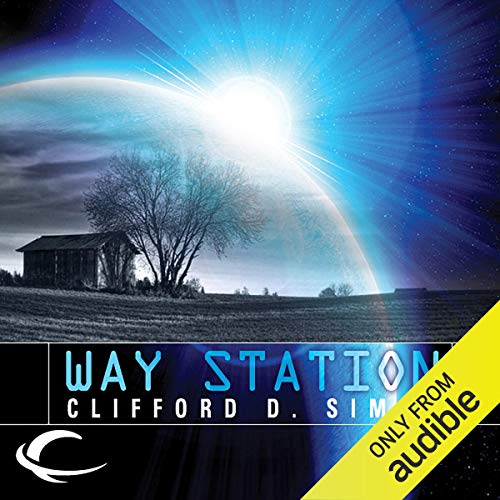![]() Way Station by Clifford D. Simak
Way Station by Clifford D. Simak
 Way Station is Clifford D. Simak’s 1964 Hugo Award-winning novel. By many readers it is considered his best, and it features some his favorite themes: a rugged Midwesterner who shuns society, human society flirting with nuclear disaster, a more enlightened galactic society that is wary of letting unruly humans join in, an appeal to common sense and condemnation of man’s penchant for violence.
Way Station is Clifford D. Simak’s 1964 Hugo Award-winning novel. By many readers it is considered his best, and it features some his favorite themes: a rugged Midwesterner who shuns society, human society flirting with nuclear disaster, a more enlightened galactic society that is wary of letting unruly humans join in, an appeal to common sense and condemnation of man’s penchant for violence.
Having recently read Simak’s 1952 fixer-up novel City, in which dogs and robots take over Earth in the far future, I’m getting a pretty good sense of the author’s likes and dislikes.
He was born in a small Wisconsin town (just like my father, incidentally), attended the University of Wisconsin-Madison (also like my father), spent time working as an editor at various newspapers, and finally became a science-fiction writer.
 I grew up in Honolulu, Hawai’i, but my dad took me back to my grandmother’s house in Delafield, Wisconsin every summer and winter, and I developed an affinity for the rhythms of country life there, including the lush greens of trees and blues of lakes in summer, the bitter but beautiful white snow-cover of winter, the rolling hills of pastures and various crops, lots of birds and squirrels and possums and deer, and more than anything the hearty but modest folk, most of whom are really warm and welcoming when they get to know you.
I grew up in Honolulu, Hawai’i, but my dad took me back to my grandmother’s house in Delafield, Wisconsin every summer and winter, and I developed an affinity for the rhythms of country life there, including the lush greens of trees and blues of lakes in summer, the bitter but beautiful white snow-cover of winter, the rolling hills of pastures and various crops, lots of birds and squirrels and possums and deer, and more than anything the hearty but modest folk, most of whom are really warm and welcoming when they get to know you.
But there is certainly a strong desire for people to respect each other’s space and privacy, and with acres between each residence, everyone has plenty of time on their own to mind their own affairs. That’s how they like it, I suspect.
 Simak’s novel Way Station is about a man named Enoch Wallace, who is rumored to have been a veteran in the Civil War, but lives a solitary life on a small farm and has almost no doings with his neighbors other than during brief encounters during his daily walk on his property.
Simak’s novel Way Station is about a man named Enoch Wallace, who is rumored to have been a veteran in the Civil War, but lives a solitary life on a small farm and has almost no doings with his neighbors other than during brief encounters during his daily walk on his property.
From the outside, there is nothing interesting about him or his little house and shed, but in fact this placid façade houses a secret way station for aliens making pit-stops during interstellar travel. Since the aliens never go outside, but merely chat and swap stories with Enoch, nothing seems untoward.
The only problem is that Enoch never ages, and finally the CIA gets wind of this and sends someone to investigate. When they snoop around and find a strangely-engraved gravestone, they unearth it and discover something shocking.
Unlike City, which was really a series of loosely-connected stories that didn’t add up to a compelling story, Way Station is a well-plotted novel that takes its time with lots of intriguing episodes as Enoch meets a myriad of different aliens, including an alien named Ulysses who becomes his friend. It’s quite endearing that he feels more connection with the aliens than with the people around him, but sad that he has a strong enough yearning for human contact that he invents an entire group of imaginary friends to converse with like real people. One wonders how much of Simak can be found in Enoch’s character, and how much is just storytelling.

The only problem is that the aliens’ cure is almost as bad as the disease. Enoch reaches a crisis point when ornery locals, the CIA, and hostile aliens all converge on his little place, and the story really delivers a satisfactory conclusion which isn’t that predictable.
Having read a number of recent novels with massive page-counts but disappointing finishes, I really appreciate a nicely-paced story that delivers the goods in under 250 pages. Way Station really stands the test of time (much more than City, in my opinion) and is worth your precious reading time. 
The audiobook is narrated by Eric Michael Summerer and he does a nice job of capturing the steady Midwestern rhythms of the story and narrator.
~Stuart Starosta
![]() I’m not likely to ever forget the concept of an alien way station hidden inside a midwestern farmhouse. Utterly charming.
I’m not likely to ever forget the concept of an alien way station hidden inside a midwestern farmhouse. Utterly charming.
~Kat Hooper




I really should read more of Simak’s work–I re-discovered some of his short stories in one of my old textbooks, and I’d forgotten how good they were.
Really thoughtful review, Stuart. I loved the paragraph about your childhood. It’s beautifully written.
Thanks, Marion. I’m pretty sure there aren’t too many kids who grew up in Hawaii but spent every summer and Christmas in Wisconsin. The grocery store staff was amazed when my mom pulled out a Hawaii driver’s license to write a check, with a snow storm right outside!